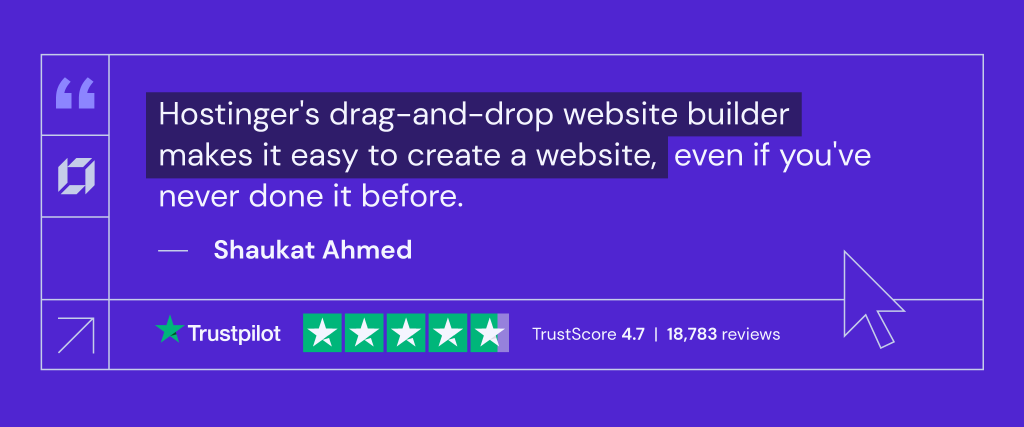What is a website builder, how does it work, and how to choose the right one
A website builder is an online platform that helps anyone easily create a website without coding, regardless of experience or skill. It’s a useful tool for small businesses and individuals who want to establish an online presence quickly and efficiently.
Most website builders come with an intuitive drag-and-drop interface and pre-made templates. Some platforms also have AI builders that automatically create sites according to specified prompts.
Keep reading to learn more about how website builders work, their benefits and features, and how to pick one that meets your needs.
How website builders work
Most website builders are designed to be easy to use regardless of your technical skills. To start building a website, all you need is a web browser and a website builder account.
After setting up your account, the website builder will give you a selection of templates to choose from. They usually come with a predefined color scheme, style, layout, and other elements that set the website’s overall visual tone.
You can customize the templates to fit your preferences or work with a blank template to design your website from scratch.

More modern website builders use artificial intelligence (AI) to help you create a website. Simply describe the website you want to make, and the AI will create one based on your preferences.

From here, you can modify the website by dragging and dropping various website elements, like headings, texts, and images, straight onto the page. This way, you can see and adjust the results as you go.

What are the benefits of using a website builder?
Thanks to its many benefits, a website builder provides an approachable site creation experience. Let’s have a look at some of them.
Code-free
With a website builder, you don’t have to deal with coding when making changes to your website. You can simply drag and drop website elements and interact with its various settings.
The only feature that requires code is code embedding, which is optional to use. It allows you to add third-party widgets and custom code to your website.

For example, in Hostinger Website Builder, you can embed a customer reviews section from an external review site using the readily available code.

Time-efficient
Instead of creating a website from scratch, website builders save you time by offering pre-built templates. Most website builders provide hundreds to choose from, which you can then further customize to fit your website needs.
Some builders also integrate AI into the creation process. As an example, we asked our AI Website Builder to create an About Us page for a basket-weaving business.

In under a minute, it created an introductory page from the ground up that featured relevant headings, descriptions, images, and even a contact form. From here, we could also prompt the AI to create other individual sections and elements within the page.

User-friendly
Most website builders use the What You See Is What You Get (WYSIWYG) approach. This means that you will see what your website will look like to visitors as you build it.
It also brings together all of the necessary tools to create a website without installing additional plugins or extensions. The user interface offers everything from web elements to page management, visual settings, performance tools, and AI assistance.
Lastly, most builders ensure that your site is mobile-responsive by default, passing on the user-friendly experience to smartphone users.
Cost-effective
Builders generally come bundled with web hosting and domain registration services.
For instance, both the domain and web hosting are included in Hostinger’s Premium Website Builder plan, which starts at $2.99/month and has a 30-day money-back guarantee.
Website builders also offer tools and functionality that would otherwise cost extra as standalone services. These include features like SEO analytics, social media and eCommerce integrations, and AI assistants.
Finally, website builders empower users to create websites on their own instead of hiring and relying on a professional.
No design experience is needed
With a website builder, you don’t need to be a professional or hire one to create a good-looking site. Website builders offer a wide range of templates and customization options to fit your desired look and feel.
For instance, Hostinger Website Builder offers 150 designer-made website templates. Each can be customized extensively, including its colors, fonts, and layouts.

Besides templates, you can also ask the website builder’s AI for design ideas and solutions.
Low maintenance
Since the website builder takes care of web hosting and other technical aspects, you really only need to update the website’s content. Even that comes easily, as you can simply log into the builder and edit the necessary elements.
How to choose the right website builder
When choosing a website builder, it’s important to consider the type of website you want to create. For instance, most builders allow you to create a simple business website, blog, or online store.
So, research each builder to learn more details before settling on an option.
To find the best website builder for you, consider these factors:
- Ease of use. Explore your options and see which builder seems most intuitive to you. This will help streamline the website-building process.
- Design flexibility. Look for a builder that offers a wide range of customizable templates. This way, you’ll be sure to create a design that fits your brand.
- Mobile responsiveness. Users are three times more likely to visit your website using a mobile device. So, find out if the builder offers mobile-friendly templates and layouts to ensure a smooth experience for smartphone users.
- SEO features. Check if the builder offers SEO tools. They help optimize your website for an enhanced user experience and a higher search results rank.
- Customer support. Read customer reviews on each builder’s customer support team. A responsive customer support team will help you resolve issues quickly.
- Pricing. Compare prices among website builders and what features they offer. Also, consider how additional costs, like web hosting and domain registration, will affect your bottom line.
- Possibility for testing. Some website builders offer free trials or a money-back guarantee period. Take advantage of them to test out the product. This will give you first-hand insights into how specific builders work and whether they suit your needs.
Conclusion
You don’t have to be an expert in design and web development to build a website on your own.
The template-based, coding-free approach of a website builder and its intuitive drag-and-drop interface empower everyone, including beginners, to create a website in minutes.
The level of customization, functionality, and price offered by a website builder makes it a feasible option for individuals and small businesses looking to build a simple yet unique website.
After deciding what kind of website you’d like to have, create a list of preferred website builders that can deliver what you need. Then, compare them based on ease of use, design flexibility, customer support, and pricing to choose the best online website builder for you.
If possible, test out several website builders before finally making your choice. Hostinger Website Builder offers a 30-day money-back guarantee, which is enough to get a good understanding of how the builder works and whether it can meet your website needs.
What is a website builder FAQ
What does a website builder do?
A website builder provides an intuitive, coding-free toolset for creating a website. It offers an array of customizable templates with drag-and-drop elements that empower individuals and small businesses to create an online presence.
Who can use a website builder?
Anyone can create a site using a website builder. They are designed to be accessible, especially for people with no coding or design experience. Most website builders come with all the essential features to get a website up and running quickly and painlessly.
What is the difference between a website designer and a website builder?
A website designer is a professional who specializes in crafting the look of websites. On the other hand, a website builder is a tool that allows anyone to create a site on their own using AI, drag-and-drop elements, and pre-designed website templates.





Comments
May 07 2024
how create the web
May 08 2024
Hi there! When creating your website, you have two excellent options: WordPress for a familiar platform or Hostinger's Website Builder for simplicity. Customize your site with the Site Editor, add content, and preview your progress whenever you like. When everything looks perfect, simply hit publish to make your website live on the internet ?